Included below are videos and presentations about, or related to, the ACED project and/or episodic disabilities and work. The list includes videos and slide presentations produced by the ACED team or produced by organizations external to ACED if they feature ACED activities, findings or project team members talking about episodic disabilities and work.

Deciding whether to share health information at work: A new evidence-based tool for workers with chronic conditions
In this presentation, Dr. Monique Gignac focuses on the challenges inherent in the decision-making process. She outlines how different workers prioritize information, and how this relates to their disclosure decisions and work context. She also describes the new ACED decision-support tool called DCIDE that aims to help workers navigate the complexity of disclosure decisions.
Presented at IWH Speaker Series
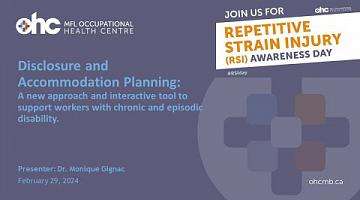
Disclosure and Accommodation Planning: a new approach and interactive tool to support workers with chronic and episodic disability
This presentation for the Manitoba Federation of Labour Occupational Health Centre RSI Awareness Day includes background information highlighting the challenges around disclosing personal health information and receiving support, a demonstration of the ACED Job Demands and Accommodation Planning Tool (JDAPT), and evaluation results for the JDAPT as of February 2024.
Presented at Manitoba Federation of Labour Occupational Health Centre RSI Awareness Day
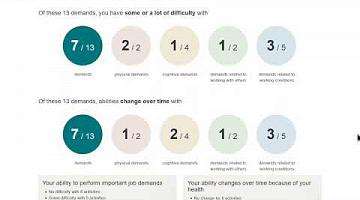
Introducing the JDAPT
This video provides a short introduction to the JDAPT for workers.
Posted
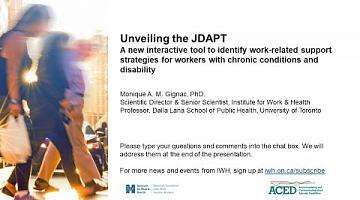
Unveiling the JDAPT: A new interactive tool to identify work-related support strategies for workers with chronic conditions and disability
In this presentation, Dr. Monique Gignac describes the JDAPT tool, its development, as well as data from two studies on the tool. She discusses the JDAPT’s potential to help workers by focusing on work solutions, not medical diagnoses and symptoms.
Presented at IWH Speaker Series

Long COVID as an Episodic Disability: Implications for Communication, Disclosure & Accommodation Planning
Dr. Monique Gignac was invited to give a presentation to the 10th Annual Employment Accessibility Resource Network (EARN) Conference on the unique challenges that long COVID and other episodic disabilities present for workers and workplaces, with a special focus on communication and accommodation planning.
Presented at Employment Accessibility Resource Network (EARN) Conference

Disclosure and Accommodation Planning – What do we need to improve job retention for people who are living with a disability?
Presented at 2022 Rethinking Disability Conference (RDC): The Future of Work
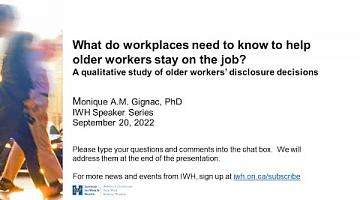
What do workplaces need to know to help older workers stay on the job?
In this presentation, Dr. Monique Gignac shares insights from her study on older workers’ workplace support needs and disclosure decisions. This research highlights the experiences of older adults in staying employed and the barriers they face in communicating support needs, and the results underscore what employers can do proactively to promote job sustainability across the life course.
Presented at IWH Speaker Series

Working with an Episodic Disability
As young people finishing school or in the early parts of their careers, they may be wondering about navigating the world of work with an episodic disability like MS. Dr. Monique Gignac provides information on what the evidence in this area tells us about talking to an employer and what someone might need to think about in terms of accommodation and support in their work environment.
Presented at MS Can Be 2021
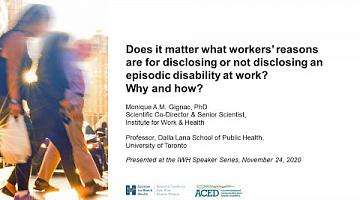
Does it matter what workers’ reasons are for disclosing or not disclosing a disability at work? Why and how?
Deciding whether or not to disclose a disability to others at work is a complex consideration. People with many chronic mental and physical health conditions, often called episodic disabilities, experience times of relative wellness punctuated by intermittent periods of activity limitations. How do they decide whether or not to disclose their health conditions? In this presentation, Dr. Monique Gignac shares findings from her study examining participants' reasons and goals for disclosing—and whether these matter to work support outcomes.
Presented at IWH Speaker Series

Episodic Disabilities, COVID-19 and the Workplace
ACED Director Dr. Monique Gignac presented on organizational perspectives on the successes and challenges of disability communication-support processes including new data related to working with COVID-19.
Presented at Workforce Planning Board of Waterloo, Wellington, and Dufferin

Accommodating and Communicating about Episodic Disabilities (ACED): A Partnership to Deliver Workplace Tools and Resources to Sustain the Employment of People with Chronic, Episodic Conditions
ACED Director Dr. Monique Gignac presented on study findings regarding the disclosure of chronic, episodic health conditions and ACED research activities.
Presented at St. Michael’s Hospital- Occupational Medicine Rounds

Accommodating and Communicating about Episodic Disabilities (ACED): A partnership to deliver workplace tools and resources to sustain the employment of people with chronic, episodic condition
ACED Director Dr. Monique Gignac presented on ACED research activities and the development of the JDAPT in this webinar.
Presented at Epilepsy Toronto, Workplace Workshop Series

Accommodating episodic disabilities—issues for workplaces to consider
ACED Director Dr. Monique Gignac shared accommodation best practices identified by her research, while leading labour lawyers provided guidance on meeting legal obligations.
Presented at Lancaster House audio conference

Arthritis Advice: Workplace health & wellness
In this Arthritis Advice video, Arthritis Society-funded researcher Dr. Arif Jetha, a scientist at the Institute for Work & Health and a member of the ACED research team, suggests things workers with arthritis can do to help manage the impact of their arthritis at work.
Posted

WDPI conference—What workplace parties are saying about the challenges of accommodating episodic disabilities
ACED project director Dr. Monique Gignac shares the methods and early findings of the first phase of ACED, which involved talking to workplace parties about the key issues and challenges in supporting workers with chronic, episodic conditions, and how communication processes within a workplace facilitate or prevent disability prevention and support efforts.
Presented at Work Disability Prevention and Integration Conference
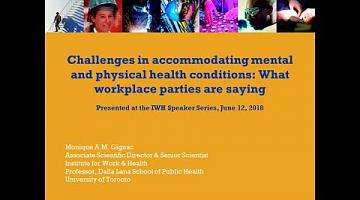
IWH Speaker Series—Challenges of accommodating episodic conditions: What workplace parties are saying
In this presentation Dr. Monique Gignac, ACED project director describes early findings from a ACED study examining organizational perspectives on implementing work disability prevention and management practices, as well as key issues in supporting workers with chronic, episodic conditions.
Presented at IWH Speaker Series
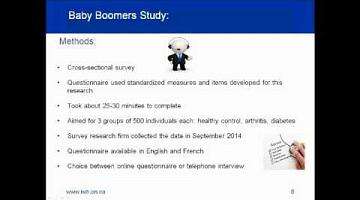
Keeping the boom(ers) in the labour market: Can existing workplace policies and accommodations make a difference?
Understanding accommodation use is critical for employers who want to retain older workers and who desire information about the potential value of current workplace practices. In this talk, ACED project director Dr. Monique Gignac discusses research on accommodation needs, accommodation use and employment outcomes among Canadian workers aged 50-67 years who are living with arthritis and/or diabetes and how they compare to workers with no chronic conditions.
Presented at WWDPI Webinars

Supporting workers with arthritis through job accommodations
In this video, ACED project director Dr. Monique Gignac, a senior scientist and scientific co-director at the Institute for Work & Health, shares findings from an earlier study on the use of, and outcomes associated with the use of, workplace supports among workers with arthritis.
Posted
